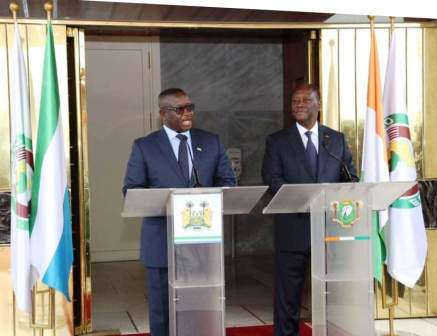Exclusive interview with Alassane Ouattara, president of Côte d’Ivoire ‘The priority is economic recovery’
On the sidelines of the 66th Session of the UN General Assembly in New York, President Alassane Ouattara of Côte d’Ivoire spoke about the situation in his country and the challenges facing his presidency. The outbreak of civil war in 2002 had led to the country’s de facto partition between a rebel-controlled north and the south under former President Laurent Gbagbo. After peace agreements, elections were held in late 2010, with Mr. Ouattara internationally recognized as the winner. But Mr. Gbagbo and his supporters refused to step down, bringing several months of conflict before the forces supporting Mr. Ouattara gained control of Abidjan. Mr. Ouattara was then officially inaugurated president in May 2011. On 24 September, four months later, he gave this exclusive interview to André-Michel Essoungou (Africa Renewal) and Maha Fayek (UN Radio). President Alassane Ouattara of Côte d’Ivoire: “It would be unfortunate if the FPI does not participate in these elections. Photo: Africa Renewal / John Gillespie
Ten years after the beginning of the war, followed by the post-electoral political crisis that rocked your country, and now several months since you rose to power, what is the political situation in Côte d’Ivoire?
The political situation is stabilizing. The government is in place. So are the Constitutional Court, the Supreme Court, the Economic and Social Council, the Chancellery and the mediator’s office. This was achieved in record time. Only the parliament remains, with elections to be held soon. The date is to be set by the Independent Electoral Commission. The government and political parties would like them to be held before the end of the year; mid-December is envisaged.
I personally would like all major parties to actively participate. I am hearing, while I’m here in New York, that the members of the Front populaire ivoirien [FPI, the party of former President Laurent Gbagbo] have stopped participating in the activities of the Independent Electoral Commission. Even before finding out the reason for this upon my return to the country, I would like to remind the members of the FPI that democracy starts with the parliament. It would be unfortunate if the FPI does not participate in these elections. It would be a mistake for the party. I would like all parties to participate.
According to some media accounts, one of the demands of the FPI for taking part in the elections is amnesty for former President Laurent Gbagbo. What do you say to that demand?
Laurent Gbagbo has been accused of economic crimes. He is in Korhogo in the northern part of the country. The courts are doing their work. You cannot ask me to meddle in the judicial system. In addition, Laurent Gbagbo has committed crimes against humanity, war crimes, and murder; some 3,000 people were killed during the post-election crisis that he caused.… For the sake of transparency in judging him, I approached the International Criminal Court (ICC), which has not yet ruled. I further find it strange that the FPI leadership would make such a request. It is inadmissible. The citizens of Côte d’Ivoire must select their deputies, and I cannot accept preconditions.
In countries that have been through armed conflict, it often happens that the institutions in charge of judging crimes committed during that period are accused of pursuing a justice of the victors. In the case of Côte d’Ivoire, how do you respond to such accusations?
That accusation is baseless in the case of Côte d’Ivoire. I have just pointed out that I want Laurent Gbagbo to be tried by the ICC, precisely because I do not want to be accused of carrying out justice only for the victors. You can’t be more transparent than that.
That said, I want to build the rule of law and respect human rights. I am against murder. I can’t accept that in my country citizens can be killed because of their religion, their ethnic origin or because they are exercising their basic rights. The issue is simple: the judicial system must do its work. We don’t want impunity in Côte d’Ivoire. I think that’s in everyone’s interest.
What are your government’s priorities for the economy?
In general, the priority is economic recovery, along with reconciliation and security. To achieve recovery, increasing private investment is a particular priority. To do that, we must clean up the business environment, in the judicial and administrative areas and in granting contracts. We are working in that direction.
We have also undertaken emergency efforts to ensure access to safe drinking water, electricity, free medicines, and so on. Some notable social investments have been made. We have likewise taken up a number of projects that have been on hold for a dozen years, projects relating to infrastructure and highways. And we began work on a third bridge in Abidjan, a very big project that will cost €200 million.
Resources are coming, thanks to renewed trust and the treasury’s ability to float new bonds, which have been 160 per cent subscribed. These resources must be well used. We are confident. The International Monetary Fund predicts a growth rate of 8-9 per cent next year, compared to this year, when we have experienced a 5 per cent decrease in national production because of the crisis. That’s a spectacular jump. We must ensure that this growth benefits the people. That is why our emergency investments have given priority to the social sector.
You became president of Côte d’Ivoire thanks mainly to the military support of the United Nations and France. How do you see the role of these two actors?
By intervening, the United Nations carried out its duty in Côte d’Ivoire. It would have been wrong if it had not, especially after the elections that it supported and supervised, elections that brought my victory over a candidate who not only did not want to leave power, but used heavy weapons to kill his own citizens. If the international community had not intervened, it would have meant not assisting people in danger. The intervention of the United Nations, supported by France, was completely legitimate. It was a duty.
That said, let me clarify that it was the Forces Républicaines that arrested Gbagbo and crossed the whole country in three days to reach the gates of Abidjan.… The destruction of heavy weapons [by the UN and France] helped us, but it was Ivorian forces that did the job. That was, in fact, their duty.
Peace has now returned. The democratic elections reached their conclusion. And that conclusion involved putting in office the person chosen by the people. I have the great honour of having been elected by Ivorians. I am in favour of reconciliation. I will rebuild my country and in a few years my country will be beautiful and at peace.
And what will France’s place be in the reconstruction of Côte d’Ivoire? Will French companies receive favorable treatment?
Côte d’Ivoire and France have very strong relations, old, historical relations. French companies have been in Côte d’Ivoire for decades. They work with us well and intelligently. Nothing has changed, to the contrary. We are also diversifying our relationships with other countries. In the future there will be Canadian companies in the oil sector, Chinese companies in infrastructure, African, Tunisian and Indian companies.…
France did not make a specific request to Côte d’Ivoire. We will deal with France with the same consideration we show to all investors. French investors have an advantage: they speak the French language, which many investors do not, and they know how to exploit that advantage.
SEM in collaboration with Africa Renewal www.un.org/africarenewal
Stay with Sierra Express Media, for your trusted place in news!
© 2011, https:. All rights reserved.





